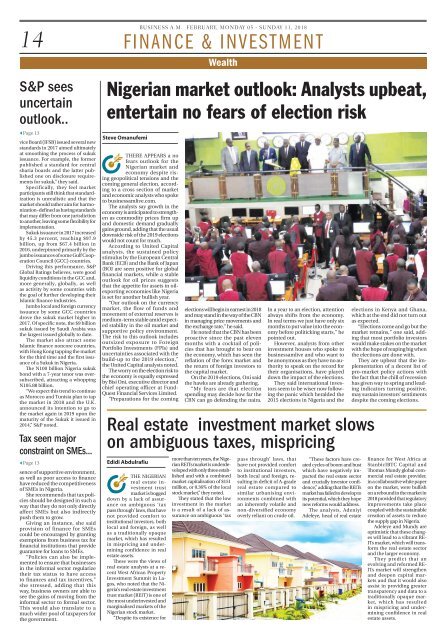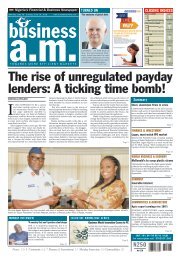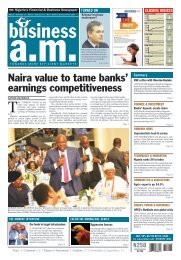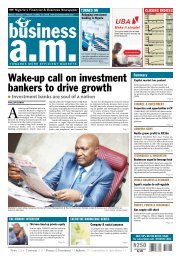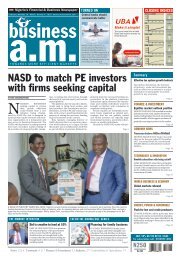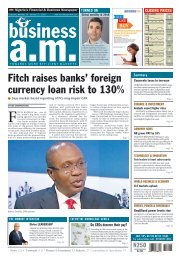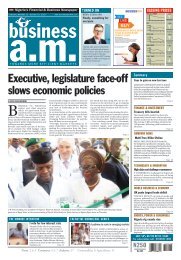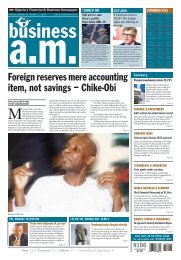Create successful ePaper yourself
Turn your PDF publications into a flip-book with our unique Google optimized e-Paper software.
14<br />
<strong>BUSINESS</strong> A.M. <strong>FEB</strong>RUARY, MONDAY 05 - SUNDAY 11, <strong>2018</strong><br />
FINANCE & INVESTMENT<br />
Wealth<br />
S&P sees<br />
uncertain<br />
outlook..<br />
Page 13<br />
vice Board (IFSB) issued several new<br />
standards in 2017 aimed ultimately<br />
at smoothing the process of sukuk<br />
issuance. For example, the former<br />
published a standard for central<br />
sharia boards and the latter published<br />
one on disclosure requirements<br />
for sukuk,” they said.<br />
Specifically, they feel market<br />
participants still think that standardization<br />
is unrealistic and that the<br />
market should rather aim for harmonization–defined<br />
as having standards<br />
that may differ from one jurisdiction<br />
to another, leaving some flexibility for<br />
implementation.<br />
Sukuk issuance in 2017 increased<br />
by 45.3 percent, reaching $97.9<br />
billion, up from $67.4 billion in<br />
2016, underpinned primarily by the<br />
jumbo issuances of some Gulf Cooperation<br />
Council (GCC) countries.<br />
Driving this performance, S&P<br />
Global Ratings believes, were good<br />
liquidity conditions in the GCC and,<br />
more generally, globally, as well<br />
as activity by some countries with<br />
the goal of further developing their<br />
Islamic finance industries.<br />
Jumbo local and foreign currency<br />
issuance by some GCC countries<br />
drove the sukuk market higher in<br />
2017. Of specific note, the $9 billion<br />
sukuk issued by Saudi Arabia was<br />
the largest issued globally to date.<br />
The market also attract some<br />
Islamic finance noncore countries,<br />
with Hong Kong tapping the market<br />
for the third time and the first issuance<br />
of a Sukuk in Nigeria.<br />
The N100 billion Nigeria sukuk<br />
bond with a 7-year tenor was oversubscribed,<br />
attracting a whopping<br />
N105.88 billion.<br />
“We expect this trend to continue<br />
as Morocco and Tunisia plan to tap<br />
the market in <strong>2018</strong> and the U.K.<br />
announced its intention to go to<br />
the market again in 2019 upon the<br />
maturity of the Sukuk it issued in<br />
2014,” S&P noted.<br />
Tax seen major<br />
constraint on SMEs...<br />
Page 13<br />
sence of supportive environment,<br />
as well as poor access to finance<br />
have reduced the competitiveness<br />
of SMEs in Nigeria.<br />
She recommends that tax policies<br />
should be designed in such a<br />
way that they do not only directly<br />
affect SMEs but also indirectly<br />
push them to grow.<br />
Giving an instance, she said<br />
provision of finance for SMEs<br />
could be encouraged by granting<br />
exemptions from business tax for<br />
financial institutions that provide<br />
guarantee for loans to SMEs.<br />
“Policies can also be implemented<br />
to ensure that businesses<br />
in the informal sector regularize<br />
their tax status to have access<br />
to finances and tax incentives,”<br />
she stressed, adding that this<br />
way, business owners are able to<br />
see the gains of moving from the<br />
informal sector to formal sector.<br />
This would also translate to a<br />
much wider pool of taxpayers for<br />
the government.<br />
Nigerian market outlook: Analysts upbeat,<br />
entertain no fears of election risk<br />
Steve Omanufemi<br />
THERE APPEARS a no<br />
fears outlook for the<br />
Nigerian market and<br />
economy despite rising<br />
geopolitical tensions and the<br />
coming general election, according<br />
to a cross section of market<br />
and economic analysts who spoke<br />
to businessamlive.com.<br />
The analysts say growth in the<br />
economy is anticipated to strengthen<br />
as commodity prices firm up<br />
and domestic demand gradually<br />
gains ground, adding that the usual<br />
downside risk of the 2019 elections<br />
would not count for much.<br />
According to United Capital<br />
analysts, the sustained policy<br />
stimulus by the European Central<br />
Bank (ECB) and the Bank of Japan<br />
(BOJ are seen positive for global<br />
financial markets, while a stable<br />
outlook for oil prices suggests<br />
that the appetite for assets in oilexporting<br />
economies like Nigeria<br />
is set for another bullish year.<br />
“Our outlook on the currency<br />
market, the flow of funds and<br />
movement of external reserves is<br />
medium-term stable amid expected<br />
stability in the oil market and<br />
supportive policy environment.<br />
The risk to this outlook includes<br />
outsized exposure to Foreign<br />
Portfolio Investments (FPIs) and<br />
uncertainties associated with the<br />
build-up to the 2019 election,”<br />
the United Capital analysts noted.<br />
The worry on the election risk to<br />
the economy is equally expressed<br />
by Bisi Oni, executive director and<br />
chief operating officer at Fund-<br />
Quest Financial Services Limited.<br />
“Preparations for the coming<br />
elections will begin in earnest in <strong>2018</strong><br />
and may stand in the way of the CBN<br />
in managing price movements and<br />
the exchange rate,” he said.<br />
He noted that the CBN has been<br />
proactive since the past eleven<br />
months with a cocktail of policies<br />
that has brought to bear on<br />
the economy, which has seen the<br />
reflation of the forex market and<br />
the return of foreign investors to<br />
the capital market.<br />
On the 2019 elections, Oni said<br />
the hawks are already gathering.<br />
“My fears are that election<br />
spending may decide how far the<br />
CBN can go defending the naira.<br />
In a year to an election, attention<br />
always shifts from the economy.<br />
In real terms we just have only six<br />
months to put value into the economy<br />
before politicking starts,” he<br />
pointed out.<br />
However, analysts from other<br />
investment houses who spoke to<br />
businessamlive and who want to<br />
be anonymous as they have no authority<br />
to speak on the record for<br />
their organisations, have played<br />
down the impact of the elections.<br />
They said international investors<br />
seem to be wiser now following<br />
the panic which heralded the<br />
2015 elections in Nigeria and the<br />
Real estate investment market slows<br />
on ambiguous taxes, mispricing<br />
Edidi Abdulrafiu<br />
THE NIGERIAN<br />
real estate investment<br />
trust<br />
market is bogged<br />
down by a lack of assurance<br />
on ambiguous ‘tax<br />
pass through’ laws, that have<br />
not provided comfort to<br />
institutional investors, both<br />
local and foreign, as well<br />
as a traditionally opaque<br />
market, which has resulted<br />
in mispricing and undermining<br />
confidence in real<br />
estate assets.<br />
These were the views of<br />
real estate analysts at a recent<br />
West African Property<br />
Investment Summit in Lagos,<br />
who noted that the Nigeria’s<br />
real estate investment<br />
trust market (REIT) is one of<br />
the most underinvested and<br />
marginalised markets of the<br />
Nigerian stock market.<br />
“Despite its existence for<br />
more than ten years, the Nigerian<br />
REITs market is underdeveloped<br />
with only three established<br />
and with a combined<br />
market capitalisation of $151<br />
million, or 0.36% of the local<br />
stock market,” they noted.<br />
They stated that the low<br />
investment in the market<br />
is a result of a lack of assurance<br />
on ambiguous ‘tax<br />
pass through’ laws, that<br />
have not provided comfort<br />
to institutional investors,<br />
both local and foreign, resulting<br />
in deficit of A-grade<br />
real estate compared to<br />
similar urbanising environments<br />
combined with<br />
an inherently volatile and<br />
non-diversified economy<br />
overly reliant on crude oil.<br />
“These factors have created<br />
cycles of boom and bust<br />
which have negatively impacted<br />
the real estate sector<br />
and crucially investor confidence,”<br />
adding that the REITs<br />
market has failed to develop to<br />
its potential, which they hope<br />
new reforms would address.<br />
The analysts, Adeniyi<br />
Adeleye, head of real estate<br />
elections in Kenya and Ghana,<br />
which at the end did not turn out<br />
as expected.<br />
“Elections come and go but the<br />
market remains,” one said, adding<br />
that most portfolio investors<br />
would make stakes on the market<br />
with the hope of reaping big when<br />
the elections are done with.<br />
They are upbeat that the implementation<br />
of a decent list of<br />
pro-market policy actions with<br />
the fact that the chill of recession<br />
has given way to spring and leading<br />
indicators turning positive,<br />
may sustain investors’ sentiments<br />
despite the coming elections.<br />
finance for West Africa at<br />
StanbicIBTC Capital and<br />
Thomas Mundy global commercial<br />
real estate provider,<br />
in a collaborative white paper<br />
on the market, were bullish<br />
on a rebound in the market in<br />
<strong>2018</strong> provided that regulatory<br />
improvements take place<br />
coupled with the sustainable<br />
creation of assets to reduce<br />
the supply gap in Nigeria.<br />
Adeleye and Mundy are<br />
optimistic that these changes<br />
will lead to a vibrant RE-<br />
ITs market, which will transform<br />
the real estate sector<br />
and the larger economy.<br />
They predict that an<br />
evolving and reformed RE-<br />
ITs market will strengthen<br />
and deepen capital markets<br />
and that it would also<br />
assist in providing greater<br />
transparency and data to a<br />
traditionally opaque market,<br />
which has resulted<br />
in mispricing and undermining<br />
confidence in real<br />
estate assets.


